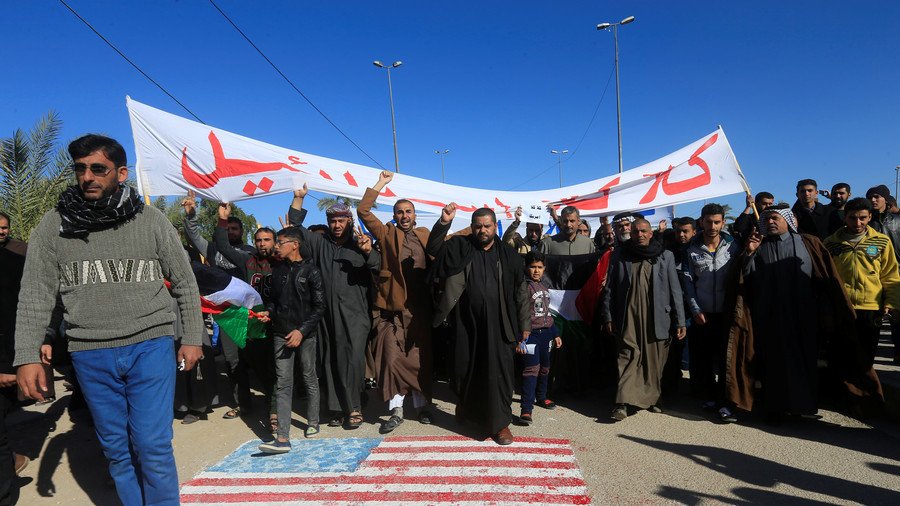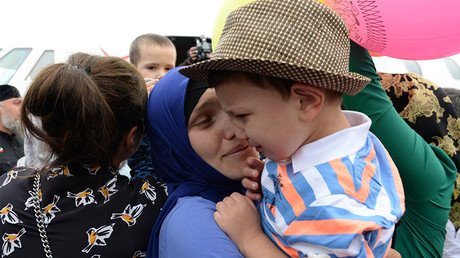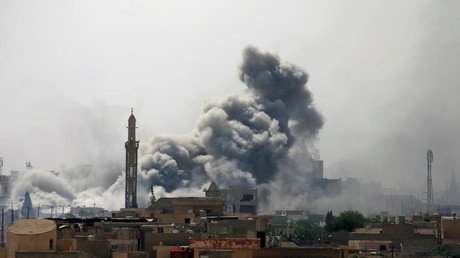‘US priorities are to bomb & destroy other countries, not rebuild them’

The difference in the amount of money Iraq needs to rebuild the country and what the US is offering suggests Washington doesn’t feel responsible for the destruction it caused, said Nicolas Davies, author of ‘Blood On Our Hands’.
The US embassy in Iraq announced $150 million will be spent this year on rebuilding cities devastated in the war on Islamic State (IS, formerly ISIS). Washington has contributed $265.3 million since 2015, the embassy said in a statement on Tuesday.
RT:The Iraqi government says it needs $100 billion to rebuild, and the US is pledging $150 million. How much difference will that make?
Nicolas Davies: That suggests that the US is not responsible for all this destruction. But we all know the reality is that it was the US and the UK who invaded and destroyed Iraq. The history of the US funding for reconstruction is utterly shameful. The US Congress in 2003 appropriated $18 billion. Five years later the US General Accounting Office concluded that only 24 percent of US reconstruction funds for Iraq had ever been dispersed…
What we really should be talking about is the payment of war reparations by the US and the UK to Iraq. In the conclusion of my book I discussed that, and I said that the best model for that is what happened after Iraq invaded Kuwait. Another UN Security Council resolution set up a compensation commission that accepted claims from Kuwait and Kuwaitis, and Iraq in the end was forced to pay $52.5 billion to settle 1.5 million claims. Now that would be an appropriate and just model for forcing the US and the UK to pay what they really owe to the people of Iraq.
US pledges extra $75mn as Iraq seeks help with $100bn post-ISIS reconstruction bill https://t.co/xRup6NHjim
— RT (@RT_com) January 10, 2018
RT: The Pentagon's spent over $14 billion fighting IS in Iraq and Syria since 2014 – vastly more than their reconstruction aid. What does that say about their priorities?
ND: Clearly their priorities are to bomb and destroy other countries – not to rebuild them. The $700 billion US military budget is for military forces and weapons. As much as the American people are told that this is about defense and that the armed forces a force for good in the world, what we have seen in the last 16-17 years is that the US military is incapable of conducting a ‘regime change’ as they put it to remove a bad regime and replace it with a better one. What they are capable of doing with all their weapons is to kill millions of people and to destroy entire cities like Mosul.
Iraqi refugees forced to return to unsafe areas, face booby traps – UN https://t.co/ITuhVGJHqI#Mosul#whocares
— RT (@RT_com) January 11, 2018
‘Huge discrepancy between money needed & what US prepared to offer’
There is no indication from Washington that the US is prepared to help in a meaningful way to get Iraq back on its feet, said Max Abrahms, assistant professor at Northeastern University.
RT: What’s your take on the difference between the sum of money Iraq is asking for and what the US is proposing? Will that make any kind of difference?
Max Abrahms: There is no question – there is a huge discrepancy between the amount of money required to rebuild Iraq and what the US is prepared to offer. There is also a huge discrepancy between the amount of money the US has invested in Iraq previously, particularly against the Islamic State group, but even well before that since toppling Saddam [Hussein] and what the US is now prepared to offer for humanitarian assistance. Iraq – parts of it, especially the Sunni areas, in particular places like Mosul, are decimated. They require a huge influx of financial support… And there is no indication from Washington that the US is prepared to help in a meaningful way to get the country back on its feet.
RT: Since 2015, the US has allocated $265 million in aid for Iraq. But locals have been telling RT that none of this aid money is reaching them. So where is it all going?
MA: It is quite possible, there is corruption. Iraqi authorities have historically been very corrupt. This was one of the main problems. The US poured tens of billions of dollars to the Iraqi Army, for example, and many of them were sort of ghost people – they were listed as fighters, but really they weren’t doing any fighting, there were just taking the salaries. That is one of the reasons why Mosul fell so quickly.
Furthermore, the administration is deeply skeptical about the UN. Vice President (Mike) Pence, for example, has openly said that Washington no longer trusts the UN to distribute the funds. Furthermore, we’re talking about $265 million, which might seem like a great deal of money, but it’s really not if you compare it to the amount of destruction throughout Iraq…
RT: Given that the US invaded and occupied Iraq, how much of a responsibility does it have to rebuild the country?
MA: There is plenty of blame to go around in terms of the rise of ISIS. And the US deserves some blame as well – largely… in terms of removing Saddam Hussein, which created a power vacuum, which allowed Al-Qaeda’s fiercest affiliate Al-Qaeda in Iraq (AQI) to develop, and that morphed eventually into ISIS… In that sense there is perhaps some moral imperative for the US to continue to help…














